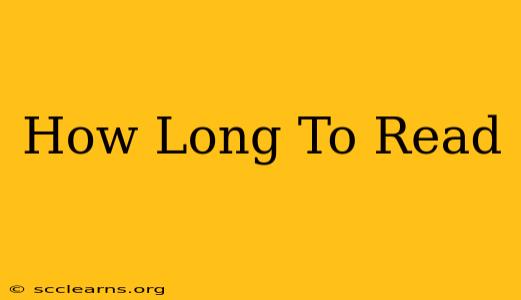How Long Does it Take to Read? A Guide to Reading Speed and Comprehension
Reading speed and comprehension are crucial skills, impacting everything from academic success to professional advancement. But how long does it actually take to read something? The answer, unfortunately, isn't a simple number. It depends on several factors. This guide explores those factors and offers tips to improve your reading efficiency.
Factors Affecting Reading Time
Several key factors influence how long it takes to read a given text:
-
Reading Level: A complex text filled with jargon or dense academic language will naturally take longer to read and understand than simpler material. Consider the target audience and the complexity of the vocabulary and sentence structure. A children's book will be much faster to read than a legal document.
-
Text Length: This is the most obvious factor. A short article will take significantly less time than a lengthy novel. Consider breaking down larger texts into manageable chunks to improve focus and track progress.
-
Reading Skill and Experience: Experienced readers with strong comprehension skills tend to read faster and more efficiently. Practice and deliberate effort are key to improving reading speed.
-
Complexity of Ideas: A text filled with intricate arguments, detailed explanations, or complex concepts demands more time for thoughtful engagement and comprehension. You might need to reread sections to fully grasp the meaning.
-
Focus and Concentration: Distractions significantly impact reading speed and comprehension. Finding a quiet space free from interruptions is essential for efficient reading.
-
Reading Method: Different reading methods impact speed and comprehension. Skimming is quick but sacrifices detail, while thorough reading is slower but ensures deep understanding. The optimal method depends on the purpose of your reading.
How to Estimate Reading Time
While there's no single formula, you can estimate reading time using a few methods:
-
Words per Minute (WPM): The average adult reading speed is around 200-250 words per minute. However, this varies widely. You can estimate your own WPM by timing yourself reading a short passage and dividing the number of words by the time taken.
-
Number of Pages and Estimated Reading Time Per Page: This is a less precise method, but useful for longer texts. Estimate how long it takes to read one page and multiply by the total number of pages. Remember to account for variations in page length and density.
-
Online Reading Time Estimators: Several online tools estimate reading time based on word count. While convenient, these tools may not account for all the factors mentioned above.
Improving Your Reading Speed and Comprehension
Here are some effective strategies:
-
Practice Regularly: Consistent reading practice is crucial for improving speed and comprehension. Set aside dedicated reading time each day, even if it's just for a short period.
-
Minimize Distractions: Find a quiet and comfortable space free from interruptions to focus on your reading.
-
Improve Vocabulary: Expanding your vocabulary improves understanding and reduces the time spent deciphering unfamiliar words.
-
Use Active Reading Techniques: Engage actively with the text by highlighting key points, summarizing sections, or taking notes.
-
Vary Your Reading Speed: Adapt your reading speed to the material. Skim less important sections and read crucial sections more carefully.
-
Speed Reading Techniques: Explore techniques like minimizing subvocalization (reading silently) and improving eye movement.
Conclusion: There's no magic number for how long it takes to read. It's a highly individualized process influenced by many factors. By understanding these factors and employing effective strategies, you can improve your reading speed and comprehension, enabling you to read more efficiently and effectively.

